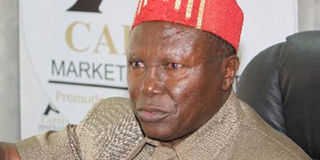Regulator contemplates second stock market to open up bourse

Capital Markets Authority chair Kungu Gatabaki, who has indicated that the regulator will license a second stock market if talks with the Nairobi Securities Exchange fail to end an impasse over the opening of the stock market to the public. PHOTO | FILE
What you need to know:
- The regulator has indicated that if push comes to shove, it will have to licence a new stock market player to spur competition in the industry which would automatically see fees reduced.
- The NSE is a private company jointly owned by 22 stockbrokerage houses and the government.
- An industry player who sought anonymity confided to the Sunday Nation that the NSE has been sitting from time to time and giving time lines on when the demutualisation exercise was to end but has now turned it into a mirage to maintain the status quo.
The Nairobi Securities Exchange (NSE) and industry regulator, Capital Market Authority (CMA) are expected to hold make-or-break talks this week to unlock a stalemate that has led to several false starts aimed at opening the stock market to the public.
The success of the talks could see more entrants into the lucrative stock market while a collapse could see CMA issue a licence for another stock market.
The turn of events marks a culmination of supremacy fights and blackmail between the regulator and “an old boys club” of stockbrokers who have made it impossible for new rules to become operational.
The regulator has indicated that if push comes to shove, it will have to licence a new stock market player to spur competition in the industry which would automatically see fees reduced.
“A competing institution is very healthy, and if the NSE board refuses to cede ground, then we will be compelled to have parallel stock market, one just like the one being contemplated in Uganda,” CMA chair Kung’u Gatabaki told the Sunday Nation.
Stockbrokers, however, read ill intent on the part of CMA, saying Mr Gatabaki and his team are being unreasonable and blowing the matter out of proportion.
“There is more to this than meets the eye that even we stock players cannot understand,” NSE vice chair and CEO Faida Investment Bob Karina, noted.
The stalemate that has lasted for half a decade old is to blame for the reduced success at the exchange in attracting new listings. The last big public listing was the government divesture in Safaricom in 2008. The bone of contention between CMA and stockbrokers has now centres on a single issue of entrance fees for new members seeking to join the NSE as traders.
The NSE has fixed a reserve price of Sh190 million for a “seat”, which provides for admission as a trader. According to NSE’s latest submissions to CMA, new entrants are to pay Sh40 million up front and a further Sh150 million in staggered payments. However, the payment of Sh40 million only grants prospective players a chance to participate in the auctioning of the seat, with the highest bidder obtaining admission.
In August 2013, Equity Investment Bank and CBA Capital were granted stockbrokerage licences. Equity Investment Bank got an investment banking licence from the CMA in 2008. CBA Capital, which was licensed as an investment bank by the CMA in 2003, is an affiliate company of the Commercial Bank of Africa Group.
The NSE is a private company jointly owned by 22 stockbrokerage houses and the government.
“The process has been quite good but we are now differing over the fee structure which is too high, making it uncompetitive for those who want to join the securities market and get access to the trading floor,” Mr Gatabaki said.
He noted that the demutualisation exercise – which will open NSE to public ownership – is aimed at making the bourse more open, but the NSE fees have been an impediment to implementation of the exercise.
The clamour for demutualisation of the NSE began five years ago following the collapse of four stockbrokers – Discount Securities, Nyagah Stockbrokers, Ngenye Kariuki Stockbrokers and Francis Thuo and partners – in quick succession. Their collapse brought to the surface the issue of governance; the cure was to open up the market to more scrutiny, the best way being to sell part of the stock market to the public.
Acting CMA CEO Paul Muthaura said the NSE requirements in fee payments are inconsistent with international best practice, noting that even the most diversified stock exchanges, like the the Australian or the New York Stock Exchanges, do not charge such high fees.
“The fees is incredible when compared to the profits the NSE bourse makes in terms of commissions from share and bond transactions, data vending and listing fees,” he said.
Mr Gatabaki dismissed claims that Kenya is too small a market to accommodate two bourses, noting that such theories were advanced when Kenya had fewer than 20 banks and more needed to be licensed.
MAINTAIN STATUS QUO
“We had a situation before where Kenya had around 17 banks. Today, we have over 42, besides numerous micro-finance institutions, and they are all making profits,” said Gatabaki, adding that “Uganda is a smaller market but it is headed the two-bourse way due to such restrictions”.
An industry player who sought anonymity confided to the Sunday Nation that the NSE has been sitting from time to time and giving time lines on when the demutualisation exercise was to end but has now turned it into a mirage to maintain the status quo. “It’s an ‘old boys’ club’ who want to keep their ownership rights and privileges,” said the source.
Mr Karina says the NSE is a mature market that has taken time to build and is worth putting a price on for those who want to own a piece of the pie. “If you put a fee of Sh10 million and thousands of people apply, how do you do the selection?” asked Mr Karina.




